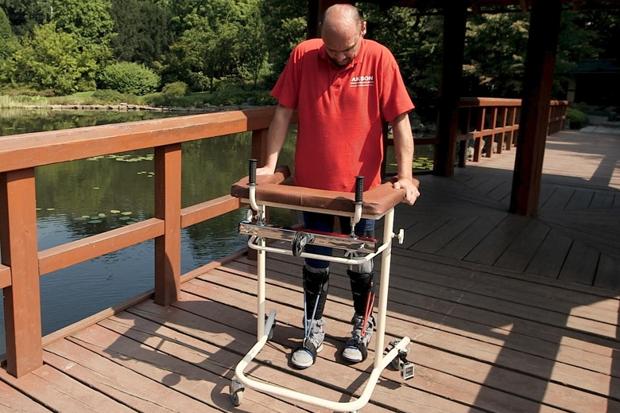| | International 
[ 2014-10-21 ] 

Darek Fidyka, the Polish firefighter paralysed after being stabbed, is learning to walk again. Cells from his nasal cavity were used to mend his sever Paralysed man walks again: ‘It’s incredible — like being reborn’
A paralysed man with a completely severed spinal
cord has learnt to walk again in a “historic”
British-led breakthrough that raises the prospect
of treatment for a condition previously believed
to be permanent.
The patient, a firefighter, was left with no
movement or feeling from the waist down after
being stabbed four years ago. In a revolutionary
procedure, cells from his nose were transplanted
into the damaged part of his spine. He recovered
the ability to walk with a frame, learnt to drive
again and has been hunting with friends.
The patient, Darek Fidyka, 38, from Poland, said
that the experience was like being reborn.
“It’s an incredible feeling, difficult to
describe,” he said. “You’re at a certain
moment in your life when you think it will never
happen again and yet... it’s possible.” His
remarkable recovery suggests that the transplanted
cells formed a “bridge” across the damaged
portion of his spinal cord, reopening
communication lines between his lower body and
brain.
The advance is the culmination of more than a
decade of fundraising and determination by David
Nicholls, a British hotelier whose son, Daniel,
was paralysed as a teenager when he dived into a
sandbank on Bondi Beach, Australia, in 2003. Mr
Nicholls set a goal of finding a treatment for
paralysis, but a consultant said that he risked
harming his son with false hope. He now wants
Daniel to benefit from the cell therapy.
Geoffrey Raisman, of University College London,
who pioneered the latest technique, said:
“Spinal cord injury is quite easy to do and
utterly devastating for the people who have it.
This opens a door that was not open before. I
think we’re looking at something historic.”
Until now, complete spinal cord injuries have been
broadly regarded as permanent and incurable. More
patients must be treated to ensure that the
finding — published today in the peer-reviewed
journal Cell Transplantation — is not a one-off,
Professor Raisman added.
About 1,000 people sustain a spinal cord injury
each year in the UK and Ireland, and about 50,000
people are living with paralysis. Sixty per cent
of all spinal injuries are incomplete — they do
not involve a severing of the spinal cord — and
retaining even a flicker of feeling or movement
gives a good chance of learning to walk again.
Previously, scientists have shown that electrical
stimulation of the spinal cord below the injury
site can restore some movement and feeling, but in
these cases it is thought that the patients had
some surviving connections across the injury
site.
The actor Christopher Reeve eventually regained
movement in his fingers and some sensation, having
been told after a horse-riding accident in 1997
that he would never again have movement below his
shoulders. He did not learn to walk.
Robin Franklin, who successfully demonstrated the
same technique in dachshunds at the University of
Cambridge, described the latest result as “quite
spectacular”. “The real efficacy of the
technique will only be known once there is a fully
randomised clinical trial,” he said. “That
said, this is very, very encouraging and it
certainly continues the forward momentum.”
Mr Fidyka, who was paralysed from wounds inflicted
by his partner’s ex-husband in July 2010, was
among the first patients to be given the
treatment. Although patients with incomplete
spinal injuries often recover, there is little
hope in cases such as Mr Fidyka’s when the
spinal nerves are completely severed. After six
months of physiotherapy, he had not improved.
Pawel Tabakow, the neurosurgeon who carried out
the treatment in Wroclaw, Poland, said: “Prior
to the transplantation, we estimated that without
this treatment, [his] recovery chances were less
than 1 per cent.”
While many hopes for regenerative treatments have
focused on stem cells, the latest method relies on
mature cells that occur within the nasal cavity.
The so-called olfactory ensheathing cells (OECs)
cover the nerves that convey smells to the brain.
Olfactory nerves have a lifespan of about 30 days
and are continually regenerated, meaning that the
OECs provide a pathway along which cells grow and
reroute themselves. It appears that the cells can
serve the same function in the spine, allowing
nerves to span across an injury site.
The patient had an initial operation to remove one
of his brain’s two olfactory bulbs, from which
the OECs were harvested. Two weeks later, the
cells were transplanted into the spine, using 100
microinjections across the injury site. A small
piece of nerve tissue from the ankle was also
grafted on to the injury site to act as a scaffold
for the spinal neurons to extend, guided by the
OECs, and reconnect at the other side.
A few months after the operation, Mr Fidyka began
gaining muscle in his left leg and was also
beginning to get pins and needles and hot and cold
sensations. About a year after the surgery he
could walk between parallel bars and with a walker
with short callipers locked at the ankles. He has
some sensation in his bladder and bowel Source -

... go Back | |



